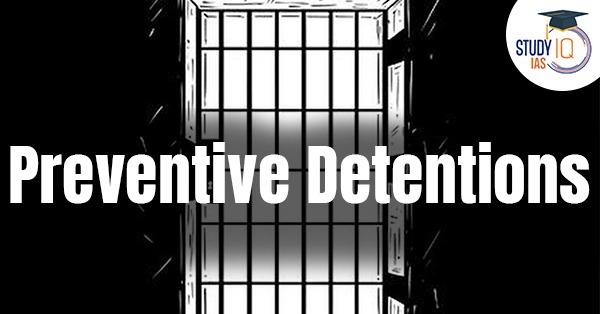Table of Contents
What is Preventive Detentions?
- Preventive Detentions is when a person is held in police custody only based on a suspicion that they would conduct a criminal act or cause harm to society.
- There are commonly two types of Detentions: Punitive and Preventive.
- Punitive Detention is to punish a person for an offence committed by him after trial and conviction in a court.
- Preventive Detentions, on the other hand, means detention of a person without trial and conviction by a court.

Why Preventive Detentions have been Registered?
- The Laws: NCRB has recorded that most of the Preventive Detentions were made under the
- The Goonda Act (State and Central)
- The National Security Act
- The Prevention of Illicit Traffic in Narcotic Drugs and Psychotropic Substances Act, 1988,
- A category classified as “Other Detention Acts”.
- ‘Other Detention Acts’ category: Since 2017, the highest number of persons have been consistently placed under the “Other Detention Acts” category.
- It includes Preventive Detentions under several laws like the Unlawful Activities (Prevention) Act and Maharashtra Control of Organized Crime Act).
- District magistrates and the police also often make Preventive Detentions to control law and order.
- Detentions under the National Security Act (NSA): Preventive Detentions under the NSA peaked in 2020 at 741. This number dropped to 483 in 2021.
Constitutional Provisions Related to Preventive Detentions
- Article 22 grants protection to persons who are arrested or detained. Article 22 (4) states that no law providing for Preventive Detentions shall authorize the detention of a person for a longer period than three months unless:
- An Advisory Board reports sufficient cause for extended detention.
- Such a person is detained in accordance with the provisions of any law made by the Parliament.
- The 44th Amendment Act of 1978 has reduced the period of detention, without obtaining the opinion of an advisory board, from three to two months.
- However, this provision has not yet been brought into force, hence, the original period of three months continues.
- Under Entry 9 of ‘Union List’, Parliament has the exclusive power to enact a law for Preventive Detention for the reasons connected with defence, foreign affairs, or security of India.
- Under Entry 3 of ‘Concurrent List’, both Parliament and State Legislature have powers to enact such laws for the reasons related to maintenance of public order or maintenance of supplies or services essential to the community.
NCRB Data Highlights: Rise of Preventive Detentions over the Last Five Years
- Highest in 2021: Preventive Detentions in 2021 saw a rise of over 23.7% compared to the year 2020. Over 1.1 lakh people were placed under Preventive Detention in 2021.
- In 2021, of the 1.1 lakh, 22 per cent of them were either in custody or still detained as of the end of the year- the highest since 2017.
- A gradual increase: The total number of people being detained has been increasing since 2017, when the NCRB started recording this data.
- In 2017, the NCRB’s report found that a total of 67,084 persons had been detained as a preventive measure that year.
- It increased to over 98,700 in 2018 and over 1.06 lakh in 2019 — before dipping to 89,405 in 2020.

Judicial Pronouncements Related to Preventive Detentions
- K Gopalan v. The State of Madras, 1950: Under this case, the lawfulness of the Preventive Detentions Act, 1950 was tested. SC ruled that, if the detention was done in accordance with the procedure of law, it cannot be said that it violates the provisions contained in Articles 14, 19, and 21 of the Indian Constitution.
- Maneka Gandhi v. Union of India, 1978: The court noted that Article 21 does not exclude Article 19 and that any statute depriving a citizen of personal liberty will have to concurrently stand up to the scrutiny of Article 21 and Article 19.
- In August 2021, during a hearing on Ayodhya issue, Supreme Court asserted the following views on Preventive Detention
- Preventive Detentions is a necessary evil only to prevent public disorder.
- State should not arbitrarily resort to ‘Preventive Detentions’ to deal with all and sundry ‘law and order’ problems, which could be dealt with by the ordinary laws of the country.
- Preventive Detentions must fall within the four corners of Article 21 (due process of law) read with Article 22 (safeguards against arbitrary arrest and detention) and the statute in question.





















 WhatsApp
WhatsApp